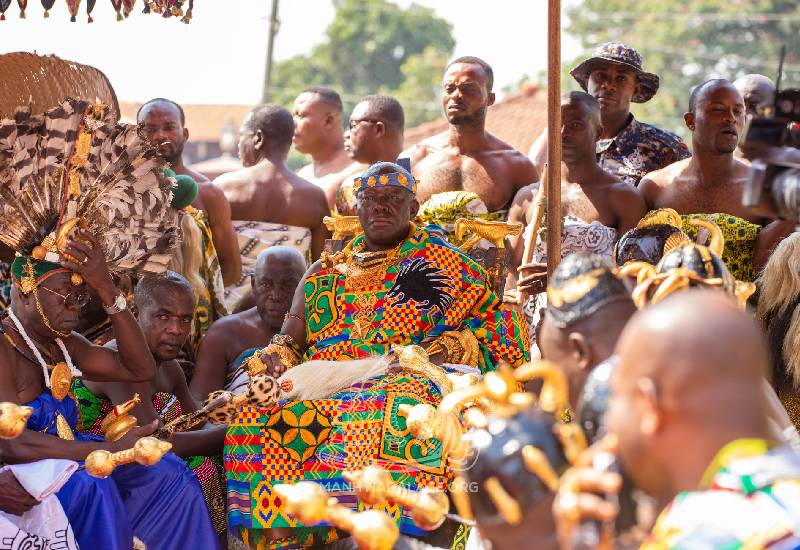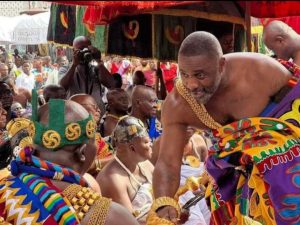Otumfuo Osei Tutu II, the 16th Asantehene (King of the Ashanti people), has carved a distinctive niche among Ghana’s traditional leaders since his ascension to the throne in 1999. His leadership is characterized by a blend of traditional values and modern advocacy, emphasizing education, health, and economic development. This multifaceted approach, coupled with his commitment to peace-building and social cohesion, sets him apart from other traditional authorities in Ghana.
The Spirit Behind His Occupancy
Otumfuo Osei Tutu II embodies the spirit of unity, development, and cultural preservation. He emphasizes the importance of traditional governance as a vehicle for community empowerment. His leadership is informed by the teachings of his predecessor, Otumfuo Osei Tutu I, and the historical significance of the Ashanti Empire. Otumfuo Osei Tutu II actively promotes the importance of education among the Ashanti people, advocating for the establishment of schools and educational initiatives that cater to both children and adults. His vision extends beyond the Ashanti Region, aspiring to unify all ethnic groups in Ghana and nurture a sense of shared identity and mutual respect.
Contentious Relationships with Other Traditional Leaders
Despite his popularity, Otumfuo Osei Tutu II has faced animosity from certain traditional leaders, notably the Dormaahene. This tension often stems from a combination of factors:
- Power Dynamics: The Asantehene holds a significant position in the cultural and political hierarchy of Ghana, which can lead to rivalries with other traditional leaders who may perceive him as a threat to their influence.
- Modernization vs. Tradition: His progressive approach to leadership, which includes addressing contemporary social issues and promoting economic development, has sometimes clashed with traditionalist views held by some leaders.
- Regional Politics: The political landscape of Ghana can exacerbate traditional rivalries. The Asantehene’s support for various national initiatives may have alienated some leaders, particularly if they felt excluded or marginalized by his influence.
Achievements since His Ascension
Otumfuo Osei Tutu II’s reign has been marked by numerous achievements:
- Educational Initiatives: He has significantly invested in educational development, launching the Otumfuo Osei Tutu II Charity Foundation, which supports scholarships, school infrastructure, and vocational training programs.
- Health Programs: He has championed health initiatives, focusing on maternal and child health, and established health facilities in various communities.
- Economic Development: The Asantehene has advocated for sustainable economic practices and the empowerment of the youth through entrepreneurship, promoting cultural heritage as a tool for tourism and development.
- Conflict Resolution: His role as a mediator in conflicts, both domestically and regionally, reinforces his position as a unifier, fostering dialogue and peaceful resolution among different groups.
- Upholding Cultural Heritage: He has actively worked to promote Ashanti culture and traditions, ensuring they remain relevant in contemporary society.
Challenges and Difficulties
Despite these successes, Otumfuo Osei Tutu II has faced several challenges:
- Political Interference: The intertwining of politics and traditional leadership has often posed difficulties, especially when political leaders have attempted to co-opt traditional authority for personal gain.
- Criticism from Rival Leaders: The aforementioned rivalries, notably with leaders like the Dormaahene, have created tensions and sometimes undermined collaborative efforts for regional development.
- Modernization Pressures: Balancing traditional values with the pressures of modernization remains a perennial challenge, particularly as younger generations seek to redefine their cultural identities in the contemporary world.
- Public Perception: Despite his global reverence, some factions within Ghana criticize his leadership style or question the efficacy of his initiatives.
Global Reverence vs. Domestic Perception
Otumfuo Osei Tutu II’s reputation on the global stage is bolstered by his advocacy work, involvement in peacekeeping initiatives, and engagement with international organizations, which have raised his profile beyond the borders of Ghana. This global recognition underscores his ability to articulate the needs and aspirations of the Ashanti people in broader contexts, thereby appealing to international audiences.
However, domestically, perceptions vary:
- Cultural Dependencies: Some individuals or groups may not fully appreciate the cultural value of traditional authority in contemporary governance, leading to underappreciation of the Asantehene’s role.
- Local Politics: Rivalries and political allegiances can skew public perception, fostering dissent among those who feel their traditional values or authority are being undermined.
- Expectations: There may also be high expectations placed upon him as a leader. When these expectations are not met, criticism and discontent can arise.
Otumfuo Osei Tutu II’s unique brand of leadership, characterized by a blend of tradition and modernity, has made him a pivotal figure in Ghana’s socio-cultural landscape. His achievements reflect a commitment to the advancement of his people while navigating the complexities of traditional authority in a modern state. Despite facing challenges and opposition, his global stature continues to highlight the importance of traditional leaders in fostering unity and progress in contemporary society.
Godwin Owusu Frimpong




